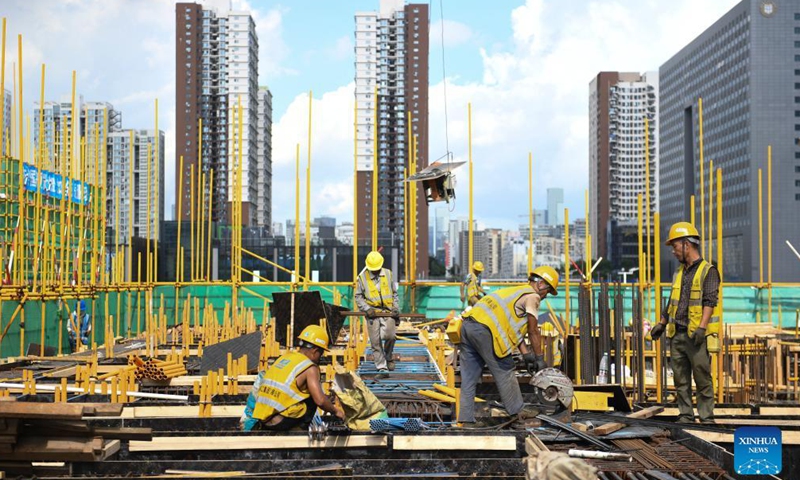
Workers operate at the construction site for a transaction center in Qianhai, Shenzhen City, south China's Guangdong Province, on Sept. 8, 2021.Photo:Xinhua
Shenzhen has announced a series of measures to enhance scientific cooperation with Hong Kong via the Qianhai economic zone, ranging from encouraging the setup of laboratories by Hong Kong colleges and universities in Qianhai to speeding up the construction of the Shenzhen-Hong Kong digital economic town, as local authorities beef up efforts to mold the Guangdong-Hong Kong-Macao Greater Bay Area (GBA) into what experts call "China's Silicon Valley."
Shenzhen Mayor Qin Weizhong said during a news conference on Monday that the Shenzhen city government will give full support to Hong Kong colleges, scientific institutions and enterprises to set up new research institutions and key labs in Qianhai.
Qianhai will also strengthen coordinated development with the Shenzhen-Hong Kong cooperation zone for technology and innovation, in order to better support the construction of an international scientific innovation center in the GBA, Qin said.
Huang Min, Shenzhen's executive vice mayor, , said that the local government would speed up the construction of a Shenzhen-Hong Kong digital economic town, while giving greater autonomy to scientific research staff in the Qianhai area to manage their research fees.
Apart from efforts to encourage Hong Kong-Qianhai scientific cooperation, the Shenzhen government will also take measures to boost Qianhai's innovative strength, several local government officials said at the news conference.
For instance, Qianhai will blend new technologies with traditional services industries to create new services business models such as industrial design and the industrial internet. An Asia-Pacific distribution base of electronic components will also be established in the area to integrate the modern services industry with high-end manufacturing.
The measures were revealed several days after the central government released a plan to accelerate the opening-up of the Qianhai-Shenzhen-Hong Kong Modern Service Industry Cooperation Zone, which includes measures to push integration of the Greater Bay Area, such as supporting qualified Hong Kong, Macao and overseas professionals to take positions at statutory bodies located in the Qianhai zone.
Over the years, Qianhai's experimental environment and opening-up policies have attracted many Hong Kong talents to work or start their own businesses there. Qianhai has attracted 3,652 Hong Kong talents, while local business incubators have fostered 245 Hong Kong start-up teams, officials said.
Team Concepts, a start-up that uses artificial intelligence and Internet of Things technology to manage high-risk workers' health and safety, is one of them. The firm's founder Roger Yiu, a Hongkonger who started a business in the Qianhai Shenzhen-Hong Kong Youth Innovation and Entrepreneur Hub around 2015, told the Global Times that he was attracted by a mixture of advantages in Qianhai.
"To name a few, Shenzhen's electronics industry chains are complete, with a wide range of products. Also, there are favorable policies ranging from incubators to rent subsidies, it's close to Hong Kong, and the environment of Qianhai is very cool in my eyes, similar to many overseas [start-up bases]," Yiu said.
Yiu also said that the entrepreneur hubs had provided much support, such as inviting some lawyers' office representatives to brief entrepreneurs on matters like taxes and patents, and holding docking activities to help them reach customers.
However, some experts noted that the GBA's scientific development lacks coordination, although the technology partnership between Hong Kong and Shenzhen is better than that among other areas.
Lin Jiang, a professor at Sun Yat-sen University in Guangzhou, said that there are high hopes for the GBA to become China's version of Silicon Valley. "This could only be achieved through coordinated tech innovation, and tech innovation could only be achieved through systemic reforms like those described in the recent plans for Qianhai and Hengqin," he said.
He said that the GBA's investment rules should be reformed gradually to be totally in line with international standards, which would pave the way for more scientific integration in the region. "Hong Kong has tech talents and universities, Shenzhen has an entrepreneurial environment, while Macao allows easy connectivity to the western part of Guangdong," he said.
Yiu suggested that more tech exhibitions for start-ups be held in Hong Kong and Shenzhen. He also suggested that large companies in Shenzhen offer more internships for Hong Kong students, so as to strengthen communication between the two cities' tech talents.


